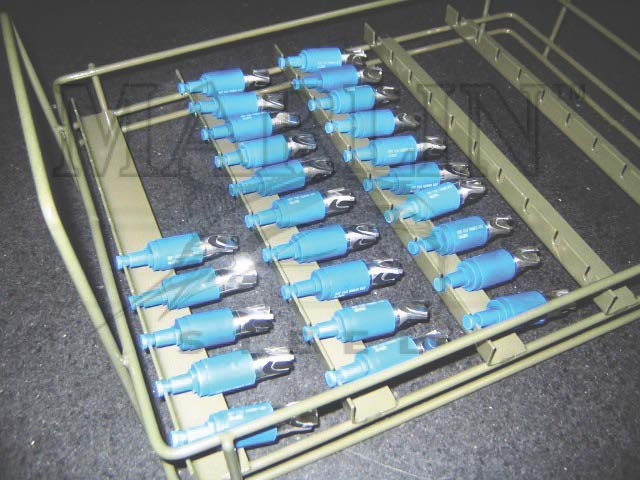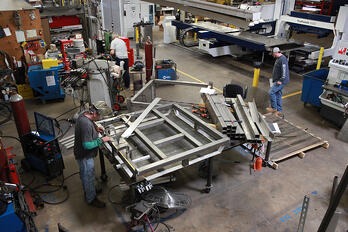 Stainless steel is a wonderfully versatile material. Many grades of stainless steel feature high corrosion resistance properties, making custom steel wire baskets and other metal forms made from stainless steel materials ideal for custom parts washing applications.
Stainless steel is a wonderfully versatile material. Many grades of stainless steel feature high corrosion resistance properties, making custom steel wire baskets and other metal forms made from stainless steel materials ideal for custom parts washing applications.
One question that customers often have of Marlin Steel’s engineering team is “do I need a special finish or coating for my stainless steel?”
The answer is: “it depends.”
Each manufacturing process and environment is different in some way. For some manufacturing processes, a special finish or coating might be necessary for a stainless steel wire rack, while said finish would be an unnecessary expenditure for others.
So, let’s take a look at some common production processes that might use a wire rack or basket, and determine if a special finish or coating would be a good idea for these processes:
Ultrasonic Parts Cleaning
Many companies employ ultrasonic parts cleaning machinery for removing tiny pieces of debris from the hard-to-clean areas of their manufactured parts.
Here, the parts and the basket are subjected to immersion in a cleaning fluid, followed by intense ultrasonic vibrations that cause the fluid to shake itself apart in a process known as cavitation. When parts are in direct contact with the basket, the vibrations that are such a key part of the process can cause the part and the basket to impact each other thousands of times.
For more delicate parts where surface condition is a concern, contact with a hard steel surface could leave scratches, which may ruin the part.
Here, it may be useful to coat the basket with soft, impact-absorbing coating so that the parts being washed do not get scratched.
However, if parts are not so delicate or if minor surface scratching isn’t a concern, then a plain finish on corrosion-resistant stainless steel might be enough.
Parts Sterilization Applications
Parts sterilization processes using a combination of heat and chemicals are very common in the pharmaceutical industry.
For many forms of the sterilization process, grade 304 or 316 stainless steel is fine with a simple plain finish. Stainless steel has a generally high temperature tolerance, and both grade 304 & 316 stainless steel have a high resistance to corrosion.
However, certain chemicals may be too much for even stainless steel. If your sterilization process involves the use of particularly harsh corrosive agents, then you might need to apply a special finish, such as a coating of Teflon or other chemical and heat-resistant coating to act as a barrier between the steel and the chemicals in the sterilization chamber.
Here, you might want to consult with an experienced mechanical engineer and go over the details of your sterilization process to determine if a special finish is warranted for your parts sterilization racks.
Heat Treat Applications
 For processes that use extremely high temperatures to cure metal, the more common forms of stainless steel are not typically recommended, as scaling or heat stress can be a problem for a fully loaded heat treat basket made from grade 304 stainless steel.
For processes that use extremely high temperatures to cure metal, the more common forms of stainless steel are not typically recommended, as scaling or heat stress can be a problem for a fully loaded heat treat basket made from grade 304 stainless steel.
Rather, baskets made for heat treat applications are typically made of Inconel or a similar metal engineered to not lose tensile strength at high temperatures.
For many of these processes, special coatings or finishes are not typically used.
Handling Products
Manufacturers in the pharmaceutical and processed food industries often have to deal with not just solid parts, but other products.
In these industries, the electropolishing of steel wire racks and baskets is a common practice. Using the electropolish finishing process leaves custom steel forms with an exceptionally smooth, defect-free surface.
The smoothness of the steel’s surface after electropolishing makes it ideal for food and pharmaceutical applications, and is often easier to clean than equivalent baskets with a plain finish thanks to the enhanced anti-stick properties granted by the electropolishing process.
This can be helpful in maintaining the baskets after exposure to stray solids or fluids in the manufacturing process.
For basic materials handling of bulk parts, however, a special finish is rarely necessary.
When in Doubt, Ask an Expert
 Each and every manufacturing process is different in some way. Where one process might need a specialized coating to prevent the basket or rack from breaking, a slightly different process might be fine with just a plain coating.
Each and every manufacturing process is different in some way. Where one process might need a specialized coating to prevent the basket or rack from breaking, a slightly different process might be fine with just a plain coating.
This is why it’s important to consult with an experienced mechanical engineer when designing your custom wire baskets or racks. They’ll be able to show you if a coating is necessary to prolong the useful life of your investment, or if you can skip the special finish. You can contact one of our mechanical engineers here.
Need help choosing the right basket for your needs? Check out our free guide below to help you through the process:



.gif)


